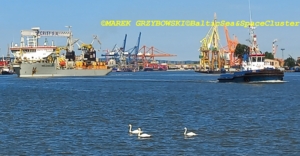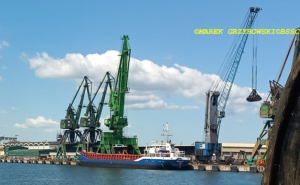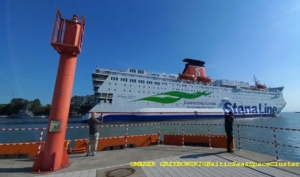ESG – trend or necessity? Shipping, ports, offshore and shipyards under the pressure of innovators



 By Marek Grzybowski
By Marek Grzybowski
An ESG guidance for shipping was published this summer,. The implementation of an ESG strategy in shipping has implications throughout the ship supply and operation chain, from design through manufacturing, operation and port service.
The guide, developed jointly by Mærsk Mc-Kinney Møller Center for Zero Carbon Shipping experts together with Boston Consulting Group analysts, is intended to help companies operating in maritime transport implement comprehensive ESG (Environmental, Social and Governance) strategies. The essence of ESG was explained during a special webinar by Tanja Dalgaard, Chief Strategy & Operations Officer, Anne Katrine Bjerregaard Head of Strategy & Sustainability Office, Mikkel Krogsgaard Managing Director & Partner, BCG Peter Jameson Partner, BCG.
– In the world of maritime business, as in other industries, ESG reporting covers topics such as recycling, greenhouse gas emissions, other types of air pollution, environmental impact, business ethics, employee health and safety, as well as safety management and prevention accidents, explain DNV experts.
Remi Eriksen, Group President and CEO, DNV and Knut Ørbeck-Nilssen, CEO of DNV GL, pointed out the need for a comprehensive approach to the implementation of the ESG strategy during the presentation of the “Energy Transition Outlook 2023” and “Maritime safety trends” reports during Nor Shipping 2023.
ESG sets standards
According to DNV, ESG reports and sustainability reports are intended to reveal the achievement of parameters in all three areas that are important for the functioning of a modern company. Reporting these parameters is intended to meet the expectations of stakeholders cooperating with the partner.
It’s about being transparent in assessing corporate responsibility. The report makes it possible to publish information that a business partner has rules, initiatives and strategies for managing under risk conditions and the ability to take advantage of the opportunities offered by management that takes into account ESG requirements.
In maritime industries, reports are published by leading companies operating both in the shipbuilding industry and maritime transport, in ports and offshore, in fishing and tourism, as well as companies operating in the vicinity of these industries.
ESG in ports
“Cargo operators recognize the role of ports [in implementing the ESG strategy] and will favor those who act according to the requirements,” noted Mark Nailer, head of the maritime division at Midstream in an article for Hellenic’s “Shipping News Worldwide”. In his opinion, “the adverse impact of the global port and terminal sector on [substances and CO2 – MG] emissions and local communities is significant.
Emissions and air pollution account for a large part of this impact, while the safety of workers [ports – MG] is another major concern. It is estimated that reducing port emissions could directly improve the health of more than 3.5 billion people by reducing air and water pollution – and indirectly improve health and well-being by helping to mitigate climate change, Nailer points to the UNCTAD report.
ESG in the shipbuilding industry
In many cases, it has already been said that shipyards should be hybrid, i.e. ensuring production and repairs taking into account environmental, social and ethical requirements.
One of the leading shipyards in implementing ESG is the Hyundai Heavy Industries Group (HHI). Already at the beginning of 2021, it adopted an ESG strategy. Within the five companies operating in the HHI Group, committees have been established for environmental protection, shaping social responsibility and implementing ethical management practices. The five participating companies are: Hyundai Mipo Dockyard Co., Hyundai Construction Equipment Co., Hyundai Electric Energy Systems Co., Hyundai Heavy Industries Co. and Hyundai Samho Heavy Industries Co.
KSOE (Korean Shipbuilding & Offshore Engineering), a group of shipyards owned by HHI, has evolved into a team of manufacturers focused on implementing innovative technologies in shipbuilding and offshore business, equipped with world-class R&D and design capabilities.
Ports under pressure from ESG leaders
Ports are starting to feel pressure on ESG performance from their biggest stakeholders and should be prepared for this to become more common and mandatory in the coming years. This means that establishing and adhering to safety, emissions and air pollution guidelines will become critical to staying competitive. Transparency will be required for sustainable management in all areas of the port’s activities and in its surroundings.
A number of initiatives that fit into the ESG strategy are already observed in the ports of Gdynia and Gdańsk, both at the level of port authorities and in terminals. In Gdynia, ferries can use land-based energy. Gdańsk is planning such a connection. Actions for the benefit of the social environment are common.
Modernization and development investments of the Polish Maritime Office in Gdynia are conducive to environmental protection. Transshipment terminals are modernized. The thing is that soon customers will require comprehensive solutions to be presented and their real impact on the final ESG effect.
Shipowners (not all) report ESG
Operators of leading fleets are implementing ESG strategies more and more actively. Data disclosure related to the environmental and social impact of shipping is becoming more and more common, Deloitte reports in the report “ESG in the Shipping sector. The role of ESG in the evaluation of shipping companies”.
– The survey of 38 shipping companies shows that there is a significant number of companies that have committed to prepare and publish an annual fleet sustainability, report shipping experts Elias Makris and Michalis Stergiou from Deloitte Greece.
24 companies (63% of the surveyed population) published at least one ESG report, of which 6 shipowners came from Greece. Of the 10 bulk carriers surveyed, seven reported ESG, while among the 10 surveyed tanker operators, only four reported ESG. Out of 6 shipowners of LPG/LNG tankers, 4 shipowners published reports and the same number of reports were published by container ship operators (out of 7 covered by the study).
Acceleration needed in implementing ESG
Shipping, and with it fishing and maritime tourism, lags behind other industries in terms of commitment to the implementation of ESG. Only some leading operator companies have taken steps to bring their operations closer to ESG requirements.
It is mainly large, global shipowners who set the directions for sustainable development. In Poland, an example is Stena Line, which introduced the most modern vessels on the Gdynia – Karlskrona connection. But practically, only part of the world’s fleet is ESG-compliant.
“Thousands of ships, millions of seafarers and a gigaton of carbon dioxide are currently not covered by ESG ambitions,” Lloyd’s List writes in its introduction to the podcast: “Why Shipping Companies Don’t Have a Credible ESG Plan”.
Why (not only) Shipping Companies Don’t Have an ESG Plan
Increasingly, however, many shippers and logistics companies, as well as final recipients, demand information about the comprehensive carbon footprint related to the transport of goods between ports, and often from the producer to the consumer. High demands are placed on sea tourism and ferry operators. This is increasingly required of fish and seafood producers and processors as well as logisticians operating in this industry.
Offshore oil and gas operators and wind farm builders pay attention to sustainable development. It can be expected that the ESG strategy will soon become the flagship of every company that intends to operate in the maritime industry. On the other hand, the ESG standard will determine the level of involvement of shipowners and ports, offshore operators and fish producers in the sustainable development of our globe.
